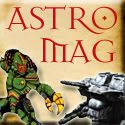My aim in these series of ongoing posts is to think aloud about how W40K and GW fandom in general may be understood in terms of debates within fan studies. To date, as far as I am aware, no one has done this.
The best way to begin would be to outline Henry Jenkins work on ‘textual poaching and then show how this has been used by Rebecca Bryant to understand roleplaying games (RPG). Using this as a starting point, I can then sketch out how these ideas can then be applied to W40K/GW fandom (to be developed in subsequent posts)
The canonical text within fan studies is Textual Poachers (1992) by Henry Jenkins. In the book, and in his subsequent work, Jenkins has sought to reject the negative cultural images of fans as ‘cultural dupes, social misfits, or mindless consumers’ (2006:40), and reframe them as marginalized subcultural groups actively appropriating media texts in order to re-read and transform them to serve their own particular interests and social agendas. For Jenkins, one does not become a fan by merely regularly watching a particular programme, but rather “by translating that viewing into some kind of cultural activity...” (ibid., 41), such as, for example, joining a discussion forum, writing stories based on the programme, collecting, attending conventions or going on ‘fan pilgrimages’ to locations used. Fandom is thus inherently active; an active, productive engagement with a media text as opposed to, for example, merely ‘watching a TV show’ or ‘knowing a few songs by that band’.
In her article, Dungeons and Dragons: The Gamers are Revolting, Rebecca Bryant makes a case for reframing the emerging scholarship into RPGs, arguing that they have more in common with forms of fan creativity than (as they are often linked with) computer games. In particular, she argues that the gaming system within RPGs operate in a similar way that, for example, a particular TV programme’s canon does for fan writers - providing a basis for creativity, a common frame of reference around which fans can improvise their own meanings, express themselves, tell their own stories etc. Aside from being an interesting theoretical move (essentially claiming RPGs for fan studies from the mass of turgid debates among mainly Scandinavian LARPers about whether, and to what extent, RPGs should be considered as games or narratives), Bryant’s article provides a useful foundation for trying to think about W40K and GW-related fandom through the lens of fan studies.
Thinking aloud, if we were to look at this, there are three issues that need to be covered first:
What is the Canon?
As an initial starting point, there would appear to be two main (albeit inter-linked) contenders for this:
- Fluff? At its most basic level, the background ‘fluff’ (i.e. the W40K) universe as expressed and developed through codexes, White Dwarf articles and officially-sanctioned (i.e. Black Library) would provide one aspect of the canon. On one level at least, it is this that provides the narrative background to the games we play, the models we construct, paint etc. - otherwise it would be just moving bits of plastic around a board and rolling dice.
- Rules? Following Bryant, the published rules could also be seen as part of the canon. Unless we play completely using house rules, the published rules provide the frame of reference around which gaming takes place. We may argue about rules or interpret them differently, but the published rules have a canonical status within each gaming system - otherwise, again, we would just be moving bits of plastic around a board (and maybe rolling dice) without having a gaming context.
Both of these could be put under the umbrella term: ‘the gaming system’. This would include both the abstract rules (AP scores, morale checks) and the ‘fluff’ which provide the context for games. The gaming system is, of course, Games Workshop’s exclusive Intellectual Property - despite how much the rules are similar to other systems or the fluff is allegedly inspired by other sources.
Fandom Vs ???????????
There is no clear or agreed-upon dividing line within fan studies between fandom and more general viewing. Does the fact that I have watched all the series of the X Files make me a fan, or do I need to have taken part in internet forums on the series, written fan fiction, read the related books etc etc? I need to give some thought to whether there is a similar dividing line within 40K/GW fandom, and if so what it is.
What Forms of Fan Creativity?
This is a slightly easier question. Again, as a starting point:
- Collecting. One dividing line between casual and fandom in W40K could be size and number of armies collected (multiple 5k armies vs a couple of minis passed down from an older brother)
- Painting/conversions
- Fanfilms: In contrast to other forms of fandom, there is not much W40K fan film. The majority of clips on youtube are short fanvids, or at the most primitive stop-motion animations. The most ambitious W40K fan film is ‘forbidden film’, Damnatus.
- Fan fiction: This would range from producing house rules, rule supplements and fan-codexes through to fan stories (see Black Library forum thread on fan fiction)
- Gaming Clubs
- Attending Tournaments/Conventions/Games Days
- Forums/blogs
TBC


No comments:
Post a Comment